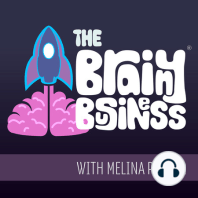51 min listen

29. Resolutions and Keeping Commitments
FromThe Brainy Business | Understanding the Psychology of Why People Buy | Behavioral Economics
29. Resolutions and Keeping Commitments
FromThe Brainy Business | Understanding the Psychology of Why People Buy | Behavioral Economics
ratings:
Length:
44 minutes
Released:
Jan 4, 2019
Format:
Podcast episode
Description
I would like to wish you all a Happy New Year! This is the first behavioral economics podcast episode of 2019. Like so many of you, December is a time of reflection for me, and planning for the year ahead. I do like the “fresh start” that comes with a new year, new quarter, new month, new client or new project…but what happens when the newness wears off? Why is it so hard to keep our resolutions even when we have the best of intentions? That is what this episode is all about. I am going to dig into 5 ways we have all been approaching resolutions wrong, and give you the strategy you need to change that in 2019 once and for all. CLICK HERE FOR YOUR FREE DOWNLOAD! Show Notes [07:38] What do you think about resolutions? Personally, I have never been a big fan. [08:18] I have never enjoyed investing time in things that will fail. The subconscious brain makes 99% of your decisions. It makes those decisions based on proven rules of thumb which it has found to work over your lifetime or our genetic evolution as a species. [08:44] When you say you want to change something you can have the best of intentions, but there’s a reason resolutions are easier said than done. [09:28] Our brains are constantly looking for rewards and many of the things that we find rewarding are the things that we want to change. [10:32] TIME DISCOUNTING - I call this the “Monday effect.” Have you ever said you would start something “on Monday”? Then…in what seems like minutes instead of hours…the alarm goes off. Where did the motivation go? Why do you feel like a completely different person today than you did last night? [13:07] Maybe tomorrow is a better day to start. Then tomorrow never really comes either. This is time discounting. [13:31] Studies have found that when you talk or think about your future self…the brain lights up as if it were talking about a completely different person! [14:20] “Future you” is actually a different person than you. [14:37] The problem comes when I wake up on Monday morning and it is time to face the music. “Oh, you mean I need to do that stuff?” [15:02] Time discounting compounds with overconfidence and optimism to make a perfect storm against change. We overestimate how good we will be at something. We also underestimate how long it will take to accomplish something. And overestimate how our outcomes will be compared to other people's outcomes. [15:50] Making your future self “real” to you so that you see yourself in the commitment can make a difference. [16:21] People saved more for retirement if they were shown a picture of themselves that looked like they had aged 10 or 20 years. [16:55] 1. When you are making the commitments, ask yourself if the plan is realistic. Think about this in terms of yourself right now. [17:19] 2. When you feel like you want to hit the proverbial snooze button (and you will) remember the commitment you made and why it is important. [17:43] 3. When making your commitment, make it something you can turn into an “I don’t” statement. [18:20] ANTICIPATED REGRET/COUNTERFACTUAL THINKING [18:25] Anticipation of regret is a huge reason people delay taking an action. [19:11] One reason regret is so powerful is because of counterfactual thinking. This is easier known as “what if” or “if only” thinking. [20:28] Your brain will combine the best features of unselected (and heavily evaluated) items into a “super choice” (which doesn’t really exist) to make you feel even worse. In this example, your brain creates a super safe, awesomely stylish car that you “could have had if only you hadn’t picked the stupid good deal” car. [20:41] Our brains want the immediate gains and benefits of “now” instead of waiting for something that is good for us in the future. [21:32] To make your resolutions stick, watch out for anticipated regret and all the times you start to think about “what ifs” and “if only’s” that aren’t leading to your goal. [21:52] Before you pick your resolution, be sure it is something you really want a
Released:
Jan 4, 2019
Format:
Podcast episode
Titles in the series (100)
1. Unlocking The Secrets Of The Brain: That is what behavioral economics is all about. And it is what I am so passionate about. by The Brainy Business | Understanding the Psychology of Why People Buy | Behavioral Economics